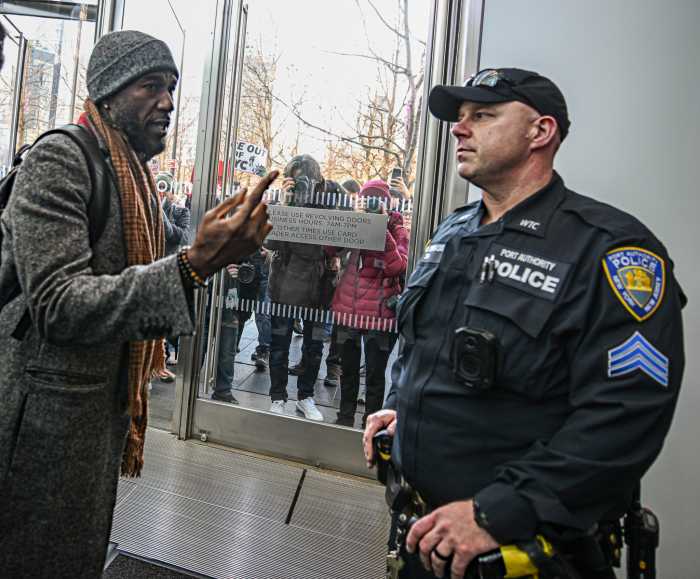As Arthur S. Leonard reported, the Supreme Court on December 7 announced on December 7 that it would review the Ninth Circuit’s Proposition 8 ruling and the New York-based Second Circuit’s ruling on the constitutionality of the Defense of Marriage Act (DOMA), but in both cases it indicated it would hear argument about whether the petitioners had standing to seek review of the decisions. The arguments in both cases will probably take place late in March, with opinions expected by the end of the high court’s term in June.
Gay City News spoke to a number of leading legal scholars and advocates or reviewed their online postings about the cases to gauge potential outcomes of high court review.
NYU Law Professor Kenji Yoshino.
Kenji Yoshino, constitutional law professor at NYU.
Writing on Scotusblog.com, Kenji Yoshino outlined potential outcomes in both the Defense of Marriage Act (DOMA) case and the Proposition 8 challenge:
What is the implication of the high court taking up both matters?
“Everyone assumed the Court would grant one of the eight petitions to review the constitutionality of DOMA… The betting was much closer on whether the Court would grant review in Perry [the Prop 8 case]. Now that the Court has taken both, some have speculated that the Court will split the difference — striking down DOMA but upholding Prop. 8. I think this forecast is incorrect.”
What is the likely outcome on DOMA and how will it be decided?
“DOMA represents an intrusion of federal law into the traditional state domain of family law. As the lower courts have pointed out through various formulations, invalidating DOMA would represent a triumph for state sovereignty as well as for gay rights. Justices on the right tend to favor state power (relative to federal power); Justices on the left tend to favor gay rights. The Justice in the middle — Justice [Anthony] Kennedy — has historically favored both.”
What are the possible outcomes in the Prop 8 case?
“The second premise is that the Court will wish to proceed incrementally — that it will not, in one Term, strike down DOMA and flip the 41 states that do not currently recognize same-sex marriage. Here, too, I agree… It might seem to follow from these two premises that the Court will split the baby between the cases. But the error lies in thinking that the Perry Court must require marriage in all 50 states or none. In fact, the Court can more narrowly invalidate Prop 8 in at least three ways.”
Yoshino described the first way as the “procedural one-state solution,” in which the high court simply finds that the Proponents of Prop 8, who brought the 2008 referendum and are the only ones defending it, do not have standing to do so. Would that restore marriage equality in California?
“As the Ninth Circuit indicated during oral argument, the impact of a ruling based on standing would be limited to requiring the clerks of Alameda County and Los Angeles County — the only county clerks named in the complaint — to issue marriage licenses to same-sex couples. Plaintiffs’ attorney David Boies predicted that the Governor would then require other counties in California to operate in a manner that would ensure statewide consistency. He further averred that if the Governor refused to do so, the plaintiffs would sue to secure such uniformity.”
Yoshino wrote that the court could also reach a “substantive one-state solution”:
“The Court could also adopt a substantive one-state solution, which was the rule adopted by the Ninth Circuit panel. The Ninth Circuit held that under the Equal Protection Clause, a state could not grant an entitlement and then take it away without a legitimate reason.”
He noted that the Ninth Circuit’s ruling relied on the 1996 Supreme Court decision that struck down Colorado’s Amendment 2, a voter initiative that barred gay rights protections in the state, finding it was based only in “animus” against gay and lesbian people. Yoshino also acknowledged that an important part of that ruling was based on gays and lesbians being denied “protections across the board,” so he addressed the distinction between Colorado’s sweeping measure and a ban solely on marriage rights:
“The [Ninth Circuit] panel acknowledged this distinction, saying that animus could be present even (or perhaps especially) when a state enacted legislation with “surgical precision.”… Romer [the Colorado case] is but one member of a family of cases in which the Court has invalidated laws that lacked a rational basis… The best reading of these precedents is that the problem with legislation based solely on animus is the animus, not the breadth of the legislation.”
Finally, Yoshino indentified a third potential narrow finding, which he calls the “substantive eight-state solution”:
“[This] would focus on the lack of justification for giving same-sex couples all the rights and responsibilities of marriage but withholding the word ‘marriage’ from them. This resolution differs from the Ninth Circuit panel’s ruling because it removes any issue of retrogression from the analysis. What is important is not that California went all the way to same-sex marriage and then retreated, but rather that California went all the way to ‘everything but marriage.’ Once it did so, it reached the point of no return. Currently, seven states besides California would be affected by such a ruling: Delaware, Hawaii, Illinois, Nevada, New Jersey, Oregon, and Rhode Island.”
Yoshino’s analysis, then, suggests that the Supreme Court will strike down DOMA, but has five potential outcomes on Proposition 8, from upholding it to striking it down in a fashion that would give all gay and lesbian people in the US a right to marry:
“There are plenty of options within Perry itself that would allow the Court to move at what one might call a stately pace.”
Kate Shaw, visiting professor at Cardozo Law School at Yeshiva University who formerly worked in the White House Counsel’s Office.
On Prop 8, Kate Shaw, in comments emailed to Gay City News, did not state a view on whether the referendum’s Proponents would be given standing to appeal the Ninth Circuit decision striking it down, but offered a view assuming the case does go forward:
“If the Court does reach the merits, a narrow opinion that closely tracks the Ninth Circuit's reasoning and saves for another day the question of whether the Constitution permits states to limit marriage to opposite-sex couples seems quite likely.”
Although the high court has also raised standing questions about the parties to the DOMA case, Shaw believes it will conclude the case should go forward. She offered her view on how the case will turn out and addressed the question of whether the stringent review the Second Circuit Court of Appeals applied to DOMA will be necessary to decide the question:
“I think the Court will conclude that it does have the authority to rule on the case, and I think it will find Section 3 of DOMA [the portion involving federal recognition] unconstitutional. I'm less sure how it will get there — my guess is that the Court will conclude that the law has no conceivable rational justification and so it fails even rational basis review, so there's no need to decide whether heightened scrutiny is appropriate.”
Cardozo Law Professor Edward Stein. | CARDOZO.YU.EDU
Edward Stein, professor and director of the Program in Family Law, Policy, and Bioethics at Cardozo Law School at Yeshiva University.
Edward Stein, in comments to Gay City News, first speculated on the implications of the high court taking up both the DOMA and the Prop 8 cases, noting a widespread view that Yoshino also acknowledged:
“Some people say they decided to take Prop 8 once they had decided to take the DOMA case. From that view, it would be the work of the conservative wing with the goal to, in essence, split the baby.”
Voicing the view that DOMA will be struck down, Stein elaborated about whether the court would apply the heightened scrutiny the Second Circuit Court of Appeals used in rendering its decision — which would have profound implications for gay rights generally and the broader question of marriage equality — or use a more lenient standard of review:
“I think they’re going to strike down DOMA, but their decision may have a different frame of reference. Perhaps states’ rights or federalism. I would surprised if there are five votes on the court for a heightened scrutiny ruling. It would be a home run if heightened scrutiny leads to DOMA being struck down. A rational basis standard worked in the First Circuit [which also struck down DOMA.] Or it could be rational basis with “bite” or informed by fundamental rights or federalism.”
Noting that Justice Anthony Kennedy wrote the Supreme Court’s 1996 decision striking down Colorado’s discriminatory Amendment 2 and the 2003 Lawrence v. Texas sodomy decision, and is considered the swing vote on the marriage cases, Stein pointed out that Kennedy did not embrace an equal protection argument, which was the basis of the Second Circuit’s DOMA ruling:
“He did not engage equal protection in Lawrence, even though he said [Justice Sandra Day] O’Connor’s equal protection argument was tenable, but not his route. Instead, he focused on the plaintiffs’ liberty interest and zone of privacy.”
Though he believes DOMA will be heard on the merits, he speculated on the possibility the court might decide that its standing questions have not been addressed and that the Second Circuit ruling in Edie Windsor’s lawsuit will be left to stand:
“If Windsor is not argued, the Obama administration might take the position it will not enforce DOMA in any case. They will need a standard, even if provisional, until the Supreme Court resolves the issue.”
On Prop 8, Stein might best be described as “optimistic,” but not fully “confident”:
“If the court gets to the merits, I think they will take a narrow frame on the case and affirm… I’m still not as confident as [litigators David] Boies and [Ted] Olson. If their perspective is a narrow one, they are likely to affirm [the Ninth Circuit ruling striking down Prop 8].”
If the referendum’s Proponents fail to show they have standing and the case is not considered on the merits, Stein said the issue is not as clear-cut as marriage equality simply resuming in California:
“If they say the Proponents had no standing at the district court, that could lead to a default, but would it apply beyond the defendants or beyond the counties where they sued? Would additional action be needed to broaden the right to marry in California? And with a default, would [District Judge] Vaughn Walker’s ruling be vacated?”
Walker’s 2010 decision, Stein noted, is the most compelling ruling to date about the right of same-sex couples to marry, and its loss to gay rights jurisprudence would be “very unfortunate.”
William Eskridge, Yale law professor specializing in statutory interpretation, and Hans Johnson, president of Progressive Victory, a nonprofit group that advises organizations and political campaigns:
On Scotusblog.com, William Eskridge and Hans Johnson assessed the legal issues, but informed their analysis with the politics of marriage equality. They come from a pro-marriage equality perspective and they believe this is the issue’s “Cinderella moment,” but they urged the court to move deliberatively. In particular, they voiced concern that New York widow Edie Windsor’s victory at the Second Circuit — the DOMA challenge taken up by the high court — found that laws making distinctions based on sexual orientation are subject to heightened scrutiny, a more searching form of judicial review than is customary:
“If the Supreme Court adopted that reasoning to strike down DOMA (in Windsor) and Proposition 8 (in Perry), every state marriage law excluding lesbian and gay couples would be in immediate jeopardy, because no state could muster a compelling or substantial public interest that would satisfy the Second Circuit’s approach… Just as a Supreme Court decision upholding DOMA and Proposition 8 would be an affront to the (largely blue) half of our country opposed to anti-gay discrimination, so a decision effectively sweeping away the marriage restrictions followed in three-quarters of the states would be an affront to the other (mostly red) half of the country.
“So what should the Supreme Court do in Windsor and Perry? Surely, the Court ought not uphold DOMA… Nor should the Court uphold Proposition 8.”
In resolving the conflict between those observations, Eskridge and Johnson noted that another appeals court ruling, in a lawsuit brought in the First Circuit in Boston, struck down DOMA even though it subjected the law to a more lenient standard of review:
“The Court would be wise to rule narrowly. In another DOMA challenge that is pending before the Court, but on which the Court did not act yesterday, the First Circuit ruled that DOMA is subject to “closer than usual review” because the federal government was legislating in an area traditionally reserved for the states… The Justices are free to follow its reasoning, which would invalidate DOMA without terminating the ongoing constitutional marriage equality debate in the states. Likewise, the Justices could follow the Ninth Circuit’s narrow reasoning in Perry, which invalidated Proposition 8 because the popular revocation of equal rights did not reveal a rational basis for state discrimination.”
In the end, Eskridge and Johnson urge a more gradual advance for marriage equality than advocates on the issue are demanding:
“The country as a whole is en route to resolution of the marriage equality issue. That result is approaching more swiftly than the pundits thought possible. Cinderella waits impatiently at the altar for her Princess Charming. Full marriage equality is no fairy tale, though it is a story whose happy ending has not quite arrived.
The American Foundation for Equal Rights, which brought the Prop 8 litigation.
HRC president Chad Griffin, who co-founded AFER. | HRC
In announcing the Prop 8 lawsuit in 2009, AFER asserted that the case would result in a nationwide victory for marriage equality at the Supreme Court.
Chad Griffin, AFER’s co-founder who now leads the Human Rights Campaign, reaffirmed that confidence in a press statement:
“I believe our cherished constitutional principles will win the day and that the Court will uphold the fundamental right that all Americans can marry the one they love.”
AFER’s executive director Adam Umhoefer was similarly upbeat:
“It is past time that the nation redeem our Constitution’s promise of liberty and equality for all by ensuring that every American has the right to marry the person they love. Make no mistake, with two lower court victories and the Constitution on our side, we will prevail.”
The two lead attorneys, however, were less direct in their reactions. Theodore Olson said:
“The Supreme Court’s decision to grant review… brings us closer to the day when every American will be able to equally enjoy the fundamental freedom to marry.”
David Boies said:
“Fourteen times the Supreme Court has stated that the freedom to marry is one of the most fundamental rights — if not the most fundamental right — of all Americans… We will urge the Justices to reaffirm our Constitution’s central promises of liberty, equality, and human dignity.”
Olson voiced the hope that the Obama administration will file a brief in support of AFER’s position:
“Given the position that the government has taken in the DOMA case, the reasoning that they have used in filing their brief would apply with great effect in our case, the Perry case, as well.”
The Courage Campaign, a statewide progressive group in California, put a finer point on that hope, in a statement from its leader, Rick Jacobs:
“The White House and the Department of Justice refused to comment on the Administration's views concerning Proposition 8. Not good enough. We need our ‘fierce advocate’ in the White House to do right by the LGBT community, and take this simple, but hugely important, action.”
Other advocacy groups were more guarded in their predictions about how the Prop 8 litigation, in particular, will play out. Jon Davidson, legal director at Lambda Legal, in a press statement, said:
“It is clear that DOMA's days are numbered… As for [Prop 8], while the Supreme Court's decision to review the Ninth Circuit's correct and carefully-worded ruling delays the restoration of equal access to marriage for same-sex couples in California, we believe the lower court rulings in California will stand… If the Supreme Court finds that the proponents of Prop 8 did not have right to appeal, same-sex couples in California will again have the right to marry.”
NCLR's Kate Kendell. | NCLRIGHTS.ORG
The National Center for Lesbian Rights’ executive director, Kate Kendell, was also careful not to predict a broad, nationwide victory from the Prop 8 case:
“We are confident the Supreme Court will strike down DOMA once and for all next year, and, after four long years, will finally erase the stain of Proposition 8 and restore marriage equality to California couples.”
The American Civil Liberties Union — which, along with attorney Roberta Kaplan of Paul, Weiss, prevailed at the Second Circuit in Edie Windsor’s case — predicted victory at the Supreme Court, but hedged on whether the case would be decided in a sweeping heightened scrutiny ruling or instead in a narrow ruling based on a rational basis standard for reviewing DOMA:
“The court held that laws like DOMA that subject lesbians and gay men to unequal treatment are presumed to be unconstitutional and are legal only if the government can point to an ‘important interest’ that justifies the discrimination. A federal district court had previously held in Windsor's case that DOMA was unconstitutional even under a less rigorous constitutional standard.”







































